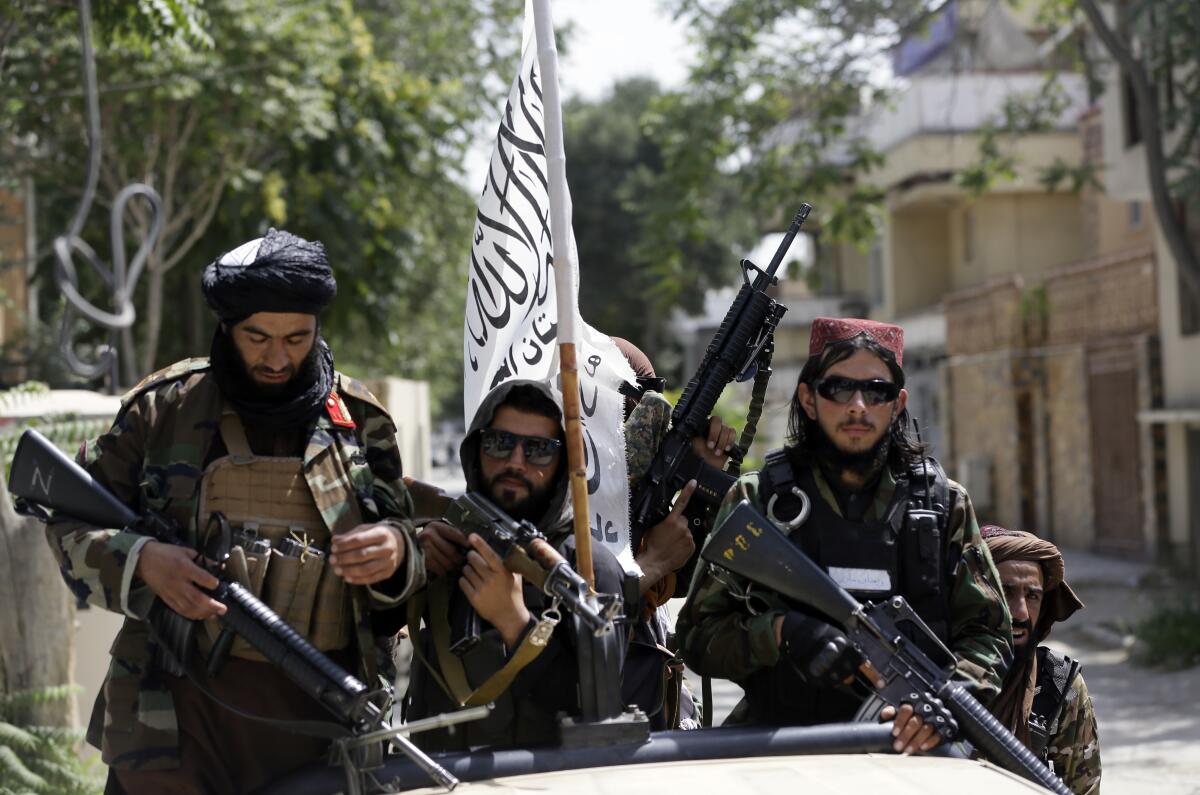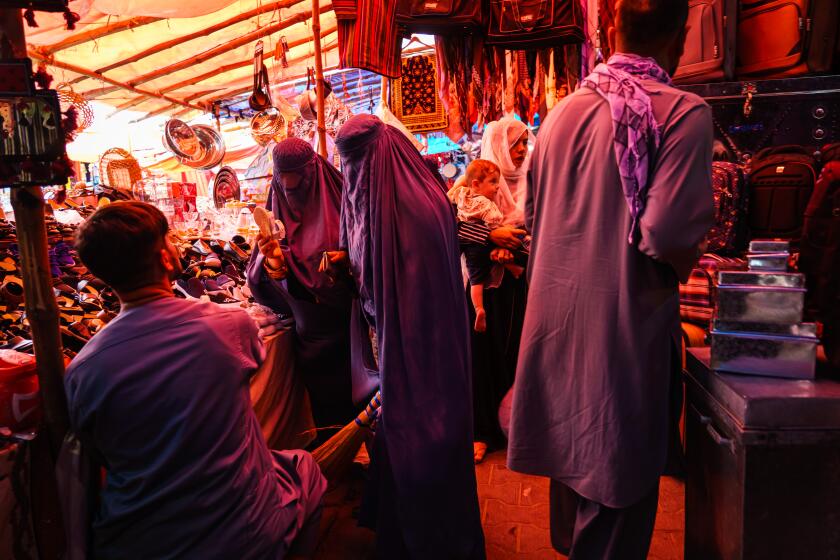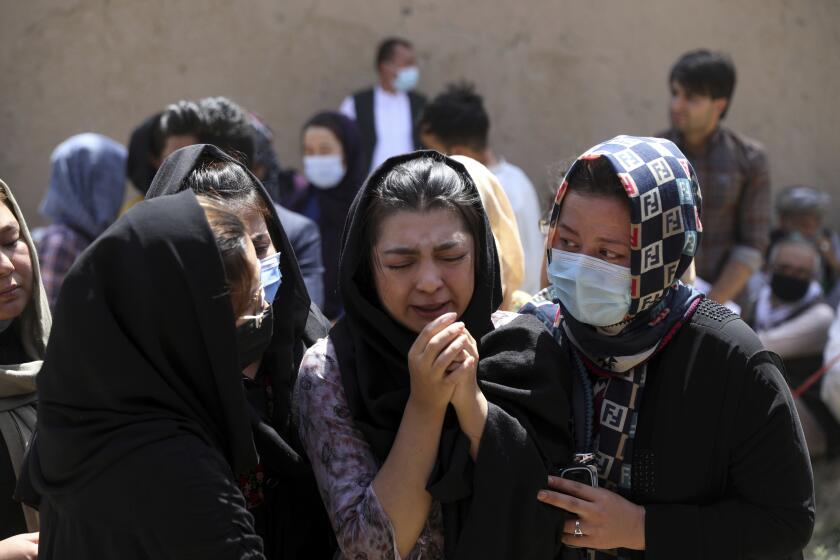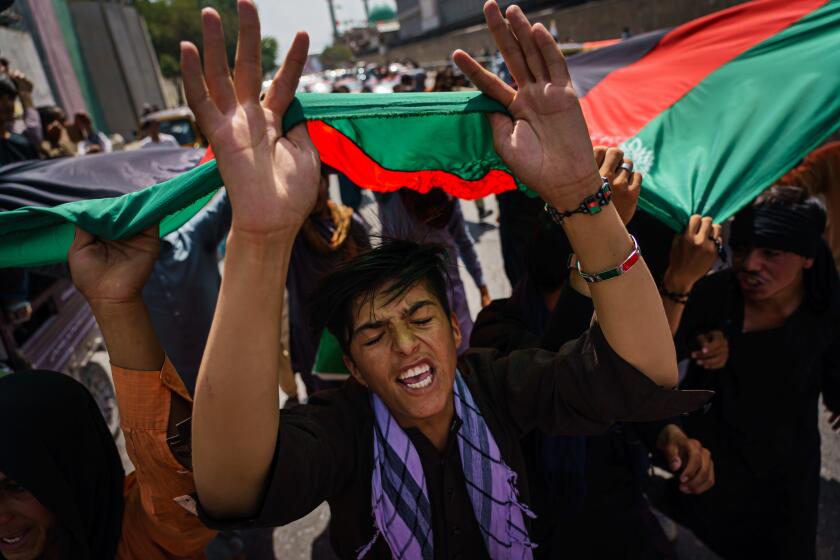Taliban killed 9 ethnic-minority men, report says, fueling Afghans’ fears

- Share via
KABUL, Afghanistan — Reports of targeted killings in areas overrun by the Taliban mounted Friday, fueling fears that they will return Afghanistan to the repressive rule they imposed when they were last in power, even as they urged imams to push a message of unity at Friday’s prayers.
Terrified that the new de facto rulers would commit such abuses and despairing for their country’s future, thousands have raced to Kabul’s airport and border crossings following the Taliban’s stunning blitz through Afghanistan. In one dramatic image, a U.S. Marine providing airport security reached over razor wire atop a barrier and plucked a baby by the arm from a crowd of people and pulled it up over the wall.
Others have taken to the streets to protest the takeover — acts of defiance that Taliban fighters have violently suppressed.
U.S. and its allies Friday stepped up evacuation efforts from the Afghan capital, Kabul, where thousands of desperate people ringed the airport
The Taliban say they have become more moderate since they last ruled Afghanistan in the late 1990s and have pledged to restore security and forgive those who fought them in the 20 years since a U.S.-led invasion. Ahead of Friday prayers, Taliban leaders urged imams to use sermons to appeal for unity and urge people not to flee the country.
But many Afghans are skeptical, fearing that the Taliban will erase the gains, especially for women, achieved in the past two decades. An Amnesty International report provided more evidence Friday that undercut the Taliban’s claims it has changed.
The rights group said its researchers spoke to eyewitnesses in Ghazni province who recounted how the Taliban killed nine ethnic Hazara men in the village of Mundarakht from July 4-6. It said six of the men were shot, and three were tortured to death. Hazaras are Shiite Muslims who were previously persecuted by the Taliban and who made major gains in education and social status in recent years.
Amnesty International warned more killings may have gone unreported because the Taliban cut cellphone services in many areas they captured.
After the collapse of the Taliban 20 years ago, Afghan Hazaras embraced hopes for a new democracy. Now they are being targeted in violent attacks.
Separately, Reporters Without Borders expressed alarm at the news that Taliban fighters killed a family member of an Afghan journalist working for German broadcaster Deutsche Welle on Wednesday. The broadcaster said fighters conducted house-to-house searches for their reporter, who had already relocated to Germany.
“Sadly, this confirms our worst fears,” said Katja Gloger of the press freedom group’s German section. “The brutal action of the Taliban shows that the lives of independent media workers in Afghanistan are in acute danger.”
Taliban fighters rough up two journalists, then seek to make amends by offering water and a sports drink.
Meanwhile, a Norway-based private intelligence group that provides information to the United Nations said it has evidence the Taliban has rounded up Afghans on a blacklist of people that the group believes worked in key roles with the previous Afghan administration or with U.S.-led forces.
In an email, the executive director of the RHIPTO Norwegian Center for Global Analyses said the organization knew about several threat letters sent to Afghans.
A report from the group that was obtained by the Associated Press included one of the letters, but the AP could not independently verify the group’s claims.
Under the Taliban’s previous rule, women were largely confined to their homes, television and music were banned, and public executions were held regularly. But leaders of the movement have pledged more moderation this time.
An Afghan tradition was all but stamped out by religious extremists who — hearing sin instead of song — outlawed music and threatened with death its practitioners.
It’s not clear whether the reports of abuses indicate that Taliban leaders are saying one thing but doing another or whether they simply do not have full control over their forces. The scale and speed of their takeover seem to have challenged the leadership’s ability to control their fighters.
Amid the uncertainty, thousands have tried to flee the country, braving checkpoints manned by Taliban fighters to rush to Kabul’s airport, where a chaotic evacuation is underway.
Mohammad Naim, who said he used to be an interpreter for U.S. forces, has been in the airport crowd for four days trying to escape. He said put his children on the roof of a car on the first day to save them from being crushed by the mass of people. He saw other children killed who were unable to get out of the way.
Start your day right
Sign up for Essential California for the L.A. Times biggest news, features and recommendations in your inbox six days a week.
You may occasionally receive promotional content from the Los Angeles Times.
He urged others not to the come to the airport.
“It is a very, very crazy situation right now,” he said.
A widely seen video shared on social media showed some of the chaos when a U.S. Marine at the airport pulled a baby out of the crowd. A spokesman from the Marine Corps, Maj. Jim Stenger, confirmed that the Marine was a member of the 24th Marine Expeditionary Unit and said the baby was “cared for by medical professionals.” The baby was later reunited with its father, and they are safe at the airport, Stenger said.
It was not clear when the incident happened.
The United States is struggling to pick up the pace of evacuations it is running from Afghanistan, where thousands of Americans and their Afghan allies may be in need of escape. American military planes paused evacuation flights from the airport for six to seven hours Friday due to a lack of places available to take evacuees, but they resumed.
During a speech Friday, President Biden pledged to bring home all Americans still trapped in Afghanistan. He also said the United States is committed to evacuating all Afghans who assisted the war effort — a potentially vast expansion of the administration’s commitments on the airlift so far. Tens of thousands of Afghan translators and others, and their close family members, are seeking evacuation.
Young Afghans fear losing new freedoms and their lives to the Taliban as U.S. troops prepare to exit.
European countries are also working to bring their citizens and those who have worked with them out.
But Spanish Defense Minister Margarita Robles said Friday that its military transport planes are leaving Kabul partly empty in the tumult.
Getting to the facility is also a major challenge. Germany was sending two helicopters to Kabul to help bring small numbers of people from elsewhere in the city to the airport, officials said.
For those remaining in Afghanistan, concerns are as basic as how to get food. The U.N. food agency said Friday that it has been able to negotiate access with the Taliban to distribute aid in one provincial capital, but it has not been able to resume food deliveries to three other provincial capitals it supplies.
The World Food Program has said that some 14 million people are facing severe hunger in the nation of some 39 million. A second drought in three years, combined with fighting, had afflicted Afghanistan even before the Taliban takeover of the country on Sunday.
Akhgar reported from Istanbul, Santana from New Orleans. Associated Press writers Jan M. Olsen in Copenhagen, Denmark, Frank Jordans in Berlin, Barry Hatton in Lisbon, Kathy Gannon in Islamabad, David Rising in Bangkok and Rod McGurk in Canberra, Australia, contributed to this report.
More to Read
Sign up for Essential California
The most important California stories and recommendations in your inbox every morning.
You may occasionally receive promotional content from the Los Angeles Times.


















